Church without dedication, High Ham
| Church without dedication | |
|---|---|
 | |
| Location | Low Ham, High Ham, Somerset, England |
| Coordinates | 51°03′30″N 02°48′40″W / 51.05833°N 2.81111°W |
| Built | 17th century |
Listed Building – Grade I | |
| Designated | 17 April 1959[1] |
| Reference no. | 263114 |
The Church without dedication (also known as Church in the Field) at Low Ham in the parish of High Ham, Somerset, England was formerly a private chapel to the manor. It stands on the site of an earlier church, and was started in the early 17th century, damaged in the English Civil War, and completed in 1690. It has been designated as a Grade I listed building.[1]
History[edit]
The church was built around 1600, on the site of an earlier church, which was probably in existence in the 13th century,[2] but may have been built by Serlo de Burci.[3]
The new church was built by Sir Edward Hext and completed by Baron Stawell to be the chapel for a new manor house, however the house was never completed.[4] The gateway which was built was moved to Hazlegrove House.[5]
Architecture[edit]
The church was built of local stone with Hamstone dressings, in a Gothic style. It has a three-bay nave and two-bay chancel. The three stage tower has corner buttresses and gargoyles. It contains two bells one of which was cast before 1350 and the other around 1500.[1] There are still some remnants of 15th century stained glass in the windows.[2] The windows have decorative tracery.[6]
The interior includes monuments to Sir Edward Hext and to several generations of the Stawell family. There is a wooden chancel screen and a stone screen which was brought from St Mark's Church, Bristol. The pulpit is Jacobean.[7]
The parish of High Ham is within the Langport Area Team Ministry benefice which is part of the Diocese of Bath and Wells.[8]
See also[edit]
References[edit]
- ^ a b c Historic England. "Church in the Field (1346080)". National Heritage List for England. Retrieved 21 September 2016.
- ^ a b Dunning, Robert. "High Ham In: A History of the County of Somerset: Volume 8, the Poldens and the Levels". British History Online. Victoria County History. Retrieved 21 September 2016.
- ^ "Home". The Church In The Field. Retrieved 21 September 2016.
- ^ Historic England. "Low Ham Church (193645)". Research records (formerly PastScape). Retrieved 21 September 2016.
- ^ "High Ham with Low Ham". Huish Episcopi cum Langport Parish. Retrieved 21 September 2016.
- ^ Mowl, Tim; Earnshaw, Brian (1995). Architecture Without Kings: The Rise of Puritan Classicism Under Cromwell. Manchester University Press. pp. 12–14. ISBN 9780719046797.
- ^ "The Church Interior". The Church In The Field. Retrieved 21 September 2016.[permanent dead link]
- ^ "Low Ham Chapel, Low Ham". A Church Near You. Church of England. Archived from the original on 19 March 2016. Retrieved 21 September 2016.

